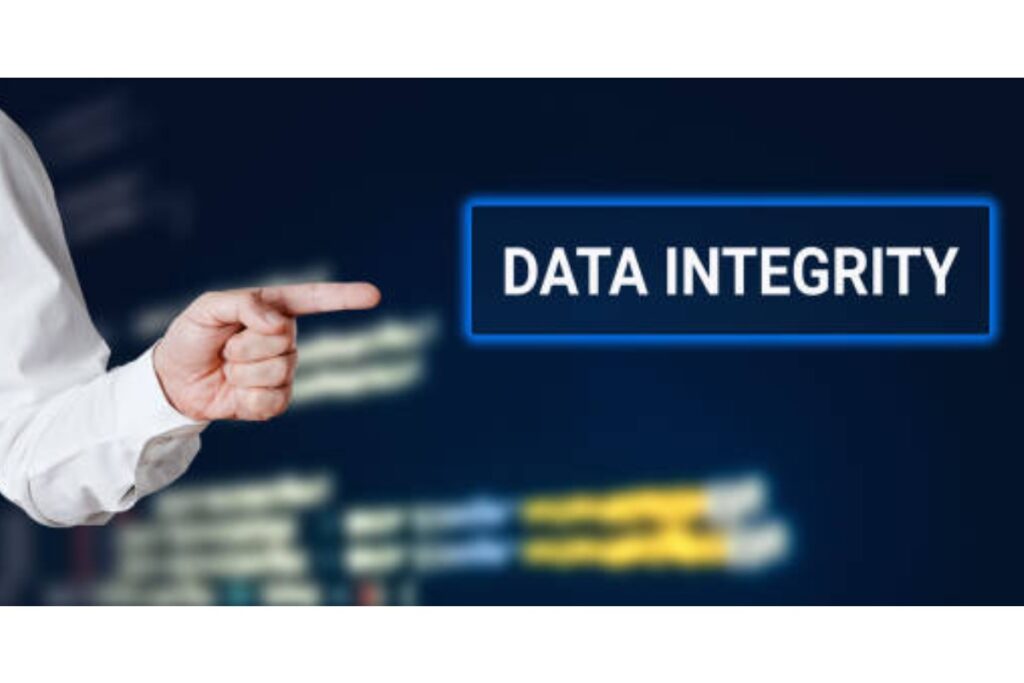Data Integrity tells us who our best customers are, which employees perform well, and how to improve our business performance. Companies need this data to make the right decisions about their current and future way.
But, leaders must ensure that the information they receive is accurate, timely, consistent and concise. Below, we explain data integrity and recommend five resources to help you improve data governance and integrity in your corporation.
What is data integrity?

Data integrity refers to how consistent a database is during its entire lifecycle. Can the information contain in the database be trust?
For a file to have integrity, it needs the following five faces:
Accuracy: Data must reflect the truth and be free of errors.
Attribution: It must be clear who recorded new data or changed existing data and when it was done.
Modernity: When someone writes something new or changes existing data, the addition or change must be immediately recorded in the database.
Readability: Records must follow notation protocols (in other words, people must add or change data using the exact instructions) so that others can understand them. If information is corrected, the reason for the change must be indicated.
Originality: All data must be kept in its novel and intact state.
There are two kinds of data integrity: physical integrity and logical integrity.
Physical integrity refers to who has entree to the data. Data may be store either on hardware, including cloud hardware, or on removable media, such as flash drives and DVDs. To achieve physical integrity, your data must be recover immediately after an event such as a flood, extreme weather, device failure, cyber attack, or connectivity and power outages.
Logical integrity requires the following four properties:
- Object integrity requires a primary key, a unique identifying identifier for each row/column record in the database.
- Referential integrity requires a foreign key, a shared reference linking a record in one database to another. For example, the foreign “order number” key may appear in customer relationship management (CRM) and shipping records. Changing a CRM record will not change a dispatch record that uses the same foreign key.
- Domain integrity is validating data in a database post (for example, the attendance of an “@” sign and a familiar TLD for email address data).
- User-defined integrity is another field that stores information unrelated to the other three.
Why is data integrity important?

To make the right decisions, businesses need accurate and timely data. Data gives stakeholders and executives a better kind of their gifts and weaknesses than their competitors. Data allows companies to identify opportunities to reduce costs, increase productivity and enter new markets.
The best day-to-day decisions are made base on real-time data. This allows you to be aware of the performance of your business in the market and the performance of your competitors.
However, the reality is that many leaders and owners of small and medium-sized businesses do not have access to what they need. According to recent data from HFS Research, 90 per cent of executives believe that high-quality data is critical to delivering successful results. However, about 75 per cent of them don’t have high confidence in their data or their company’s data architecture.
Advice. Working with an independent IT partner may make planning and implementing your data breach and cybersecurity plan easier.
Common Data Integrity Threats
The most common data integrity threats are:
- Lack of Visible Importance: Maintaining data integrity should be a core business process driven from the top, which should be clear to everyone.
- Lack of processes: You need processes to define how data is enter and change in your system, what data is recorded, and who is responsible for recording the data. Many companies use workflow figures showing data input and output and any changes that may occur.
- Lack of regular auditing: Regular data cleaning using verification and auditing tools to find errors quickly. It can also resolve data discrepancies between systems and processes.
- Data access is too broad: Employees should only have access to the data they need to do their jobs. If their accounts are compromised, this limits the hacker’s access to data by default.
- Lack of user training. You must invest in employee training so that all database users (including contractors) know how to record and modify data correctly. This dramatically reduces the likelihood of errors and incorrect formatting. This won’t eliminate all human error, but it will reduce it.
- No backups: Internal and external attackers threaten the security and privacy of your data. You must regularly use the best online backup facilities to back up your database to protect against this and any data loss due to pre-processing errors or hardware/software failure.
- Poor cybersecurity. Companies must determine which data is most valuable and conduct a cybersecurity audit to determine how best to protect it.
- Poorly configured hardware and software. When choosing new hardware or software, you should ensure it will work with modern technology and require little or no setup. Companies should ensure software spots are downloaded on the date of release and stop using software no longer support by the vendor.
How to ensure data integrity

Now that you know why data integrity is vital to companies, it’s time to learn how to achieve it. When stakeholders and executives have confidence in their data, they can move forward more violently with plans and growth.
Maximum large companies collect data using several methods, including the following:
- Company websites
- Server databases
- CRM system
- Enterprise resource planning systems
Many companies use a combination of these data collection devices. But what can you do to safeguard data integrity? Here are some ideas:
- Make sure your business management understands the vital role that data integrity plays in your daily operations.
- Delegation: Clearly define roles and responsibilities so everyone is responsible for maintaining data integrity.
- Systems, processes and verification. Front-end and back-end systems are often responsible for collecting data, but you also need a method that defines how data is enter into those systems. Most companies use workflow diagrams that display data input and output and any changes that can occur in between.
- Policy: Many companies now establish and implement policies that require regular data analysis. A common practice is creating data integrity reports focusing on data discrepancies across different systems and courses. Such reports can help firms proactively address data issues.
Recommended resources for data integrity management
Several data integrity management tools are available. Make sure you choose the one whose core feature set best matches the goals and data integrity policies you’ll create for your business.
Here are a few options to consider:
1. Data protection Digital Guardian
Digital Guardian protects your data from unauthorized external access, malicious attacks, and accidental disclosure. You can track who had access to your data and what they did with it, allowing you to quickly respond to breaches and ensure that stakeholders receive reports base on data that has not been inappropriately modified.
2. Varonis Data Classification Engine
Varonis offers a variety of data management keys, including an organization system that automatically identifies sensitive information. For organizations with multiple access levels, this can significantly reduce the resources required to protect information while keeping data available for proper business use.
3. Study employee experience surveys
Explore helps companies collect accurate data and analyze it to make decisions with its Blue survey software. You can use it to survey 100 to 200,000 people in your organization.
4. Panoply Data Management Tool
Collects Panoply collects and aggregates disparate data into a single, universal repository that can be analyze. Panoply makes it easy to get clear, high-level analysis from various sources, including marketing surveys, industry reports, and inside sales data.
5. Ataccama ONE intelligent storage platform.
Ataccama ONE is a cloud, on-premises and desktop platform that consolidates data and offers analytical recommendations through intelligent profiling. This is in addition to the essential functions of automatic data collection and processing.
Whether you choose a resource from this list, find another program that meets your needs, or create something yourself, your business will suffer if your data isn’t accurate and current. So, take the necessary steps now to ensure that data integrity is a high priority for your company.
Conclusion: The Importance of Data Integrity
Data integrity is essential to maintaining any information management system’s accuracy, consistency, and reliability. Whether in business, healthcare, finance, or technology, ensuring data integrity helps organizations make informed decisions, comply with regulations, and protect against data breaches or corruption.
Companies can protect their data from illegal access, loss, or tampering by implementing robust security measures, backup strategies, and validation techniques. Maintaining data integrity is a best practice and a necessity in today’s digital world.
Data Integrity – Frequently Asked Questions
1. What is data integrity?
Data integrity refers to data’s accuracy, consistency, and reliability throughout its lifecycle. It ensures that data remains unchanged, complete, and protected from unauthorized modification.
2. Why is data integrity important?
- Prevents data errors and corruption
- Ensures regulatory compliance (e.g., GDPR, HIPAA, SOX)
- Improves decision-making with accurate data
- Protects against unauthorized access and cyber threats
3. What are the types of data integrity?
- Physical integrity: Protects data from hardware failures, environmental factors, and natural disasters.
- Logical integrity: Ensures data remains correct and follows the rules defined in databases and applications.
4. How can data integrity be compromised?
- Human errors: misspelt entries, accidental deletions
- Cyberattacks: hacking, malware, unauthorized access
- Hardware failures: system crashes, power outages
- Mishandling data: duplicate or outdated records
5. How do organizations maintain data integrity?
- Periodic data validation and verification
- Access controls and encryption
- Automated backups and recovery plans
- Audit logs to track changes


